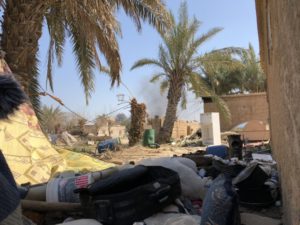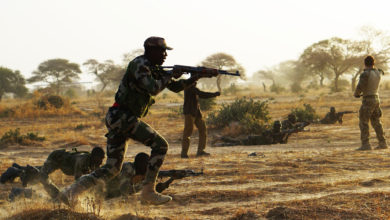
The final chapter of Islamic State has been completed successfully with the liberation of the town of Baghuz from the terrorist organization. After civilians were evacuated and hundreds of extremists surrendered, the Syrian Democratic Forces, with the participation of the Global Coalition to Defeat ISIS, put up a strong fight against the last remnants of the terrorist organization and declared to the world the destruction of the so-called caliphate.
There is no doubt that the elimination of the terrorist organization’s territory was the result of great efforts and sacrifice by SDF forces and the Coalition. High-level coordination between the parties and their strong ties will soon bring an end to the nightmare that has enveloped the entire world and turned the region into a terrorist epicenter.

The joint decisions made by the SDF and Coalition forces made the liberation of city after city possible while civilian casualties were avoided by employing precise and controlled military tactics.
U.S. President Donald Trump’s decision to leave some U.S. forces in Syria is very crucial for the next phase of the fight against ISIS, which involves uprooting its intellectual and ideological roots, requiring continuous and long-term work.
American political and military leadership, as well as members of the U.S. Congress, agree that the threat ISIS poses is far from being completely eliminated. By keeping U.S. forces in the region and rearranging the American strategy, the next phase of the fight against terror will help the SDF to preserve the gains made so far.

We want to emphasize the role of the U.S. Department of Defense, and especially the commander of CENTCOM General Joseph Votel, in the territorial victory against ISIS and for ensuring security and stability in the areas liberated from the darkness. We thank him for his leadership and the important role he played in this historic achievement.

We also want to acknowledge important role of the former Presidential Envoy to the Global Coalition to Defeat ISIS Brett McGurk in this victory, and thank him for bringing together different nations under the international Coalition and building a bridge between them and the SDF.
Though the structure of ISIS will come to an end, we also want to draw attention to some major challenges that are ahead of us: sleeper cells planted by the terrorist organization, and the danger in ISIS’s ability to reorganize itself by employing tactics of individual terrorist acts such as bombings and assassinations.
In addition, the vacuum of power left after ISIS and the partial withdrawal of U.S. forces will be undoubtedly be exploited by regional and international parties.

There is also a growing need to restore cohesion of the community and to reorganize and return people to their communities. The areas the terrorists occupied have been turned into ruins and must be revived. This revitalization will require continued support and rehabilitation at all levels so that citizens can return to their normal lives.
In accordance with the resolutions of the United Nations, the continued cooperation between the SDF and the international Coalition to counter ISIS, led by the United States of America, will contribute to the end of the Syrian crisis. The social component and diversity of our free areas constitutes the first point toward the ultimate goal of a democratic Syria, free from all forms of terrorism.
General Mazlum Abdi is the Commander-in-Chief of the Syrian Democratic Forces.
All views and opinions expressed in this article are those of the author, and do not necessarily reflect the opinions or positions of The Defense Post.
The Defense Post aims to publish a wide range of high-quality opinion and analysis from a diverse array of people – do you want to send us yours? Click here to submit an Op-Ed.











